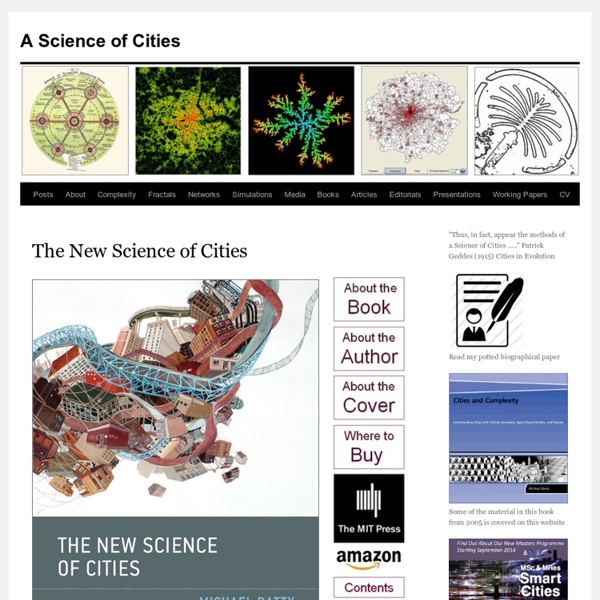



Urban Models + Spatial Complexity + Smart Cities + | Mainly Based on my Lectures at ASU, Ritsumeikan, and UCL Urban Agents & Citizen Apps, Towards an Autonomous Interactive Urban Planning Platform Fabio Carrera (MIT Ph.D.) will present some real-world applications that begin to demonstrate how it is now becoming practical to “fill the City Knowledge pipeline” from data collection, to information visualization, to modeling and interactive participation in urban planning decisions. What is emerging is the potential for an Autonomous Interactive Urban Planning Platform that: - leverages mobile applications for straight-to-the-cloud citizensourcing of urban phenomena- harvests sensor networks for real-time information- captures information as it flows through municipal administrative processes- visualizes information in multiple dimensions- models synthetic populations and their behaviors- provides instant feedback about the urban and environmental impacts in planning scenarios- allows tangible interaction in participatory planning contexts Would you like to put a link to this lecture on your homepage?
Ciudades a escala humana Complex Urban: Definitions of Scale, Form, and Culture From left to right: Speakers Darko Radović, Ulysses Sengupta, Christopher Doll, Alexandros Gasparatos. Photo: Atsuko Kawamori/UNU-IAS Event SummaryTuesday, 13 April 2010, 2:00 pm - 5:30 pm at UNU-IAS in Yokohama On April 13, 2010, four speakers and an audience of researchers, planning professionals, and students from a multitude of different disciplinary backgrounds came together to discuss definitions of the ‘urban’. Before the backdrop of global environmental change and worldwide socioeconomic restructuring, growing urban agglomerations and the increasing number of urban dwellers pose challenges to the sustainability and management of cities. Darko Radović introduced the concept of urbanity, starting from its Western roots in the idea of the Greek polis, and presenting its various de- and re-contextualisations in culturally diverse contexts and periods. Alexandros Gasparatos employed the concept of urban metabolism in order to explain how cities interact with their hinterlands.
Affiliate Students Visiting Research Students at CASA You can apply to come to CASA as an Affiliate PhD student if you are registered for a PhD at an overseas university and want to spend a period of 3 to 12 months at CASA undertaking research which is complementary to the Doctorate/PhD project at your 'home' university. All students whose first language is not English must be able to provide recent evidence that their spoken and written command of the English language is adequate for the programmes for which they have applied. Students will either be charged at the UK/EU rate or at the the Overseas Student rate. UK/EU: £4,400Overseas: £15,750 For further details on how to apply to study at CASA as a visiting research student please go to the UCL Visiting Research Students page. When completing the UCL Graduate Admission form, you must state 'Centre for Advanced Spatial Analysis' as the UCL department you are applying for, otherwise your form will not reach us.
“Urbanismo social”, individuo y vanidad. By Reyes Gallegos. Oil money. Autores desconocidos. Imagen extraida de: www.visualcomplexity.com Este post pretende ser una llamada a la reflexión sobre la dificultad que conlleva salirse de “las esferas” (1) de la sociedad y el urbanismo capitalista y reinventar nuevos modelos acordes a otros ideales, sin que se acaben repitiendo los mismos patrones más propios de la condición humana. En este sentido, y a partir de mi propia experiencia en la búsqueda de un urbanismo más social, me pregunto si está el urbanismo de la participación, tal y como lo estamos construyendo y demandando a través de las “redes sociales”, blindado contra ese individualismo vanidoso, o estamos asistiendo a una encubierta y silenciosa manifestación de los mismos síntomas en dicho terreno. (2) Habría que ampliar ese lugar de excelencia “espacio virtual” a “espacio social”, o podríamos estar creando en estas plataformas nuevas ISLAS de técnicos a los que nos falta más experiencia de participación a pie de calle. Algunas recomendaciones:
خيرت الشاطر:على الغرب دعمنا اقتصاديًا وتعويضنا سياسيًا «عن سنين دعمهم لمبارك حذر رجل الأعمال خيرت الشاطر، نائب المرشد العام لجماعة الإخوان المسلمين، من أن «مصر على شفا انهيار سياسي واقتصادي، ويجب على الغرب الحفاظ على البلاد بالمساعدات الاقتصادية والدعم الدبلوماسي». وقال «الشاطر»، في تصريحات نقلتها صحيفة واشنطن بوست، الأمريكية: «إن الولايات المتحدة وأوروبا تتجاهلان مصر وهي في خطر، بعد عام على الثورة الشعبية، التي خلعت الحليف الرئيسي للولايات المتحدة، حسني مبارك. وأضاف أن التحول الديمقراطي في مصر «معلق في الميزان«، ناصحاً الأمريكيين والأوروبيين بدعم مصر خلال هذه المرحلة الحرجة، «كتعويض عن السنوات العديدة التي دعموا فيها النظام الديكتاتوري الوحشي على حساب المصريين واعتبرت الصحيفة أن مطلب «الشاطر» غريب وغير معتاد، خاصة أنه يأتي من جماعة لطالما أبقتها الولايات المتحدة الأمريكية بعيدة، احتراماً لمبارك، الذي «اضطهد الجماعة باعتبارها تهدد الحكم المدني». وحذر رجل الأعمال الإخواني، البالغ من العمر 61 عامًا، من أن الانهيار الاقتصادي قد يسفر عن «تحول الثورة السلمية إلى ثورة جياع»، يمكن أن يكون لها عواقب وخيمة على مصالح الولايات المتحدة الأمريكية في المنطقة.
PARTICIPATORY SENSING 1/4 – the data-citizen driven city This post is the first of 4 posts about Participatory Sensing (projects and research) that are going to be published weekly for the next 4 Fridays. In these posts I will share my research on participatory sensing, open data and smartcities that I started about 6 months ago. The first post is about The data-citizen driven city project which I developed with César García, Jorge Medal and Sara Thomson on September 2011. With this project, produced by a multidisciplinary team consisting of an IT System Administrator, an Industrial Designer, an Artist and an Architect, I really started considering how data can empower communities and catalyze social change. We presented The data-citizen driven city project for the 4Th ADVANCED ARCHITECTURE CONTEST “CITY-SENSE: Shaping our environment with real-time data” by The Institute for Advanced Architecture of Catalonia on the 26Th September. Understanding reality with data, changing personal habits. Collective intelligence and critical mass.